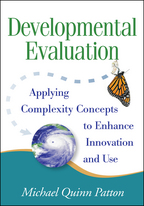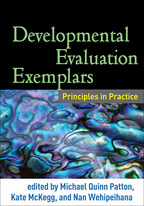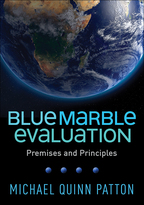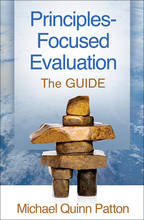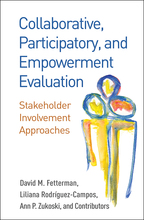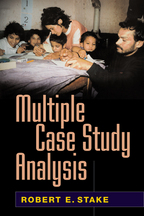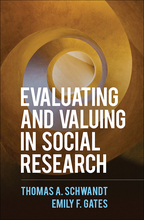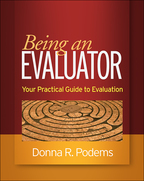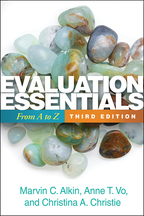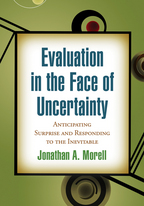Developmental Evaluation
Applying Complexity Concepts to Enhance Innovation and Use
Michael Quinn Patton

*The Distinction Emerges
*Facing Complexity and Facing Reality: Or, Facing the Realities of Complexity
*Developmental Evaluation and Complexity Theory
*Developmental Evaluation and Single-Loop versus Double-Loop Learning
*The Importance of Interpretive Frameworks
*Developmental Evaluation as Utilization-Focused
*Charting the Developmental Journey: Overview of the Book
*Five Developmental Evaluation Purposes and Uses
2. Developmental Evaluation as a Distinct Purpose and Niche
*Beyond Planning: Jumping into the Fire
*Evaluation Questions under These Different Engagement Scenarios
*Vision Encounters Reality: The Territory of Developmental Evaluation
*Systems Issues: Boundary Management as a Developmental Evaluation Focus
*Developing Innovations versus Improving and Testing Models: Developmental Evaluation Distinguished from Formative and Summative Evaluation
*Ongoing Development Informed by Developmental Evaluation
*Strategic Thinking and Developmental Evaluation
*The Niche of Developmental Evaluation: Chapter Overview and Summary
3. Thinking Outside Evaluation’s Boxes
*Creative Evaluation
*Of Plums and Prunes
*History and Biography as Context: The Personal Factor
*More History and Biography as Context
*Fundamental Principles
*Developmental Evaluation in Context
*External Evaluators and Developmental Evaluation
*Ten Key Points about Developmental Evaluation Illustrated by the Caribbean Example
4. Situation Recognition and Responsiveness: Distinguishing Simple, Complicated, and Complex
*Detecting Patterns
*Detecting Complexity as a Distinct Pattern and Territory for Inquiry
*The Challenges of Situation Recognition
*A Situation Recognition Heuristic: Distinguishing Simple, Complicated, and Complex
*Situational Evaluation: Implications for Practice
*Variations on a Theme: The Cynefin Framework
5. Systems Thinking and Complexity Concepts for Developmental Evaluation
*From Train Brakeman to Locomotive Engineer to Evaluation Champion
*Project SleepBetter
*Systems Thinking
*Complexities of Complexity
*Useful Complexity Constructs for Developmental Evaluation
*Complexity-Sensitizing Concepts
6. How the World Is Changed: A Dialectic with Thesis and Antithesis and Developmental Evaluation as the Synthesis
*Competing Perspectives on How the World Is Changed
*The Top-Down Approach
*Adaptation versus Replication: Principles for Developmental Evaluation
*Best Practices versus Effective Principles
*From the Grass Roots to the Adaptive Middle
*Alternative Approaches to Change
*Developmental Evaluation: The Action in the Muddled Middle
*Looking Back and Looking Forward
*Appendix 6.1. Positioning and Contrasting Developmental Evaluation with Other Evaluation Approaches
7. The Adaptive Cycle and Developmental Evaluation
*Some Context for Understanding the Adaptive Cycle: Poetry, Ecology, Sociology, Business, and Evaluation
*The Complexity Doorframe Redux
*Five Developmental Evaluation Purposes and Uses
*Resilience and Developmental Evaluation
*A Strategic Approach to Resilience: Engineering Resilience versus Ecosystem Resilience
*The Adaptive Cycle
*The Adaptive Cycle and Psychosocial Regimes
*Evaluation and the Adaptive Cycle
*Through the Looking Glass of the Adaptive Cycle: Examples of Organizational and Program Cycles
*Transitions and Traps
*Taking an Innovation to Scale: Challenges and Traps in Cross-Scale Change
*Panarchy: Cross-Scale Interactions
*Panarchy-Informed Evaluation: The Fact of a Doorframe
8. Developmental Evaluation Inquiry Frameworks
*Frameworks for Developmental Evaluation Inquiry
*Developmental Evaluation Inquiry Frameworks: Ten and Counting . . .
9. Developmental Evaluation Bricolage: Reflective Practice, Sensitizing Concepts, Action Research, Abduction, Systems Change, and Retrospective Developmental Evaluation
*Reflective Practice for Developmental Evaluation Inquiry and Engagement
*Sensitizing Concepts as a Focus for Reflective Practice and Developmental Evaluation
*Kia ora
*Action Research and Developmental Evaluation
*Intersections of Developmental Evaluation and Action Research: A Distinguished Evaluation Pioneer Reflects
*Reasoning and Developmental Evaluation
*In Praise of Methodological Diversity and Appropriateness: A Methods and Tools Rant
*Systems Change and Developmental Evaluation
*Retrospective Developmental Evaluation
*Damiano’s Retrospective Developmental Evaluation
*Developmental Evaluation Bricolage
10. Utilization-Focused Developmental Evaluation: Engagement Practices, Diverse Designs, and Adaptive Methods
*Different Kinds of Developmental Evaluation
*Diversity of Design and Methods Options
*Utilization-Focused Developmental Evaluation
*Ten Utilization-Focused Developmental Evaluation Design Examples
*Developmental Evaluation Engagement, Design, and Methods Summary
*The First Developmental Evaluation: A Creation Story

